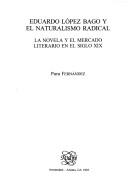| Listing 1 - 8 of 8 |
Sort by
|
Book
ISBN: 1282621254 9786612621253 1846156645 1855661667 Year: 2008 Publisher: Woodbridge : Tamesis,
Abstract | Keywords | Export | Availability | Bookmark
 Loading...
Loading...Choose an application
- Reference Manager
- EndNote
- RefWorks (Direct export to RefWorks)
During the reign of Isabel II, the new Spanish novel was born, inspired by the deep fracture between public morality and private life. In the middle of the European debate on the legalization or abolition of the carnal trade, the infamous woman emerges as a modern heroine, specifically the prostitute, a symbol of the evils that afflict contemporary society. The presence of the public woman in the popular narrative will give rise to a well-established brothel current that will legitimize the incursion of literature into the spaces of private life and into the silenced female sexuality, a necessary fertilizer for the birth of the 20th century Spanish erotic novel.
Sex customs in literature. --- Spanish fiction --- Sex customs. --- History and criticism. --- Customs, Sex --- Human beings --- Sexual behavior --- Sexual practices --- Manners and customs --- Moral conditions --- Sex --- Prostitutes in literature.
Book
ISBN: 9781846156649 9781855661660 Year: 2023 Publisher: Woodbridge Tamesis
Abstract | Keywords | Export | Availability | Bookmark
 Loading...
Loading...Choose an application
- Reference Manager
- EndNote
- RefWorks (Direct export to RefWorks)
Book
ISBN: 9788484898474 9783954873920 Year: 2015 Publisher: Madrid Iberoamericana
Abstract | Keywords | Export | Availability | Bookmark
 Loading...
Loading...Choose an application
- Reference Manager
- EndNote
- RefWorks (Direct export to RefWorks)
Sociology of literature --- Spanish literature --- anno 1800-1999

ISBN: 905183926X Year: 1995 Publisher: Amsterdam Rodopi
Abstract | Keywords | Export | Availability | Bookmark
 Loading...
Loading...Choose an application
- Reference Manager
- EndNote
- RefWorks (Direct export to RefWorks)
Naturalism in literature --- López Bago, Eduardo, --- Criticism and interpretation.
Digital
ISBN: 9783954870523 9788484898474 Year: 2015 Publisher: Frankfurt am Main Vervuert Verlagsgesellschaft
Abstract | Keywords | Export | Availability | Bookmark
 Loading...
Loading...Choose an application
- Reference Manager
- EndNote
- RefWorks (Direct export to RefWorks)
Book
ISBN: 9780826520869 9780826520852 9780826520876 Year: 2016 Publisher: Nashville, Tenn. Vanderbilt University Press
Abstract | Keywords | Export | Availability | Bookmark
 Loading...
Loading...Choose an application
- Reference Manager
- EndNote
- RefWorks (Direct export to RefWorks)
Engaging the Emotions in Spanish Culture and History is a critical analysis of the cultural significance of the emotions in Spain from the 18th century to the present, stressing their historical specificity and social effects. The essays discuss history, history of medicine, politics, literature, cinema, television, art, photography, and new media. Rather than being properties of the individual self, emotions are socially produced and deployed in specific cultural contexts, as this collection documents with unusual richness. All the essays show emotions to be a form of thought and knowledge, and a major component of social life--including in the nineteenth century, which attempted to relegate them to a feminine intimate sphere. The collection ranges across topics such as eighteenth-century sensibility, nineteenth-century concerns with the transmission of emotions, early twentieth-century cinematic affect, and the contemporary mobilization of political emotions including those regarding nonstate national identities. The complexities and effects of emotions are explored in a variety of forms--political rhetoric, literature, personal letters, medical writing, cinema, graphic art, soap opera, journalism, popular music, digital media--with attention paid to broader European and transatlantic implications.
Émotions --- Culture populaire --- Littérature espagnole --- Aspects sociaux --- Histoire --- Aspects politiques --- Histoire et critique --- Espagne --- Politique et gouvernement --- History of civilization --- History of Spain --- Histoire et critique. --- Histoire. --- Politique et gouvernement.
Book
ISBN: 0826503799 0826520855 0826520863 0826520871 Year: 2016 Publisher: Vanderbilt University Press
Abstract | Keywords | Export | Availability | Bookmark
 Loading...
Loading...Choose an application
- Reference Manager
- EndNote
- RefWorks (Direct export to RefWorks)
Digital

ISBN: 9781487510282 Year: 2018 Publisher: Toronto, Ont. University of Toronto Press
Abstract | Keywords | Export | Availability | Bookmark
 Loading...
Loading...Choose an application
- Reference Manager
- EndNote
- RefWorks (Direct export to RefWorks)
| Listing 1 - 8 of 8 |
Sort by
|

 Search
Search Feedback
Feedback About UniCat
About UniCat  Help
Help News
News